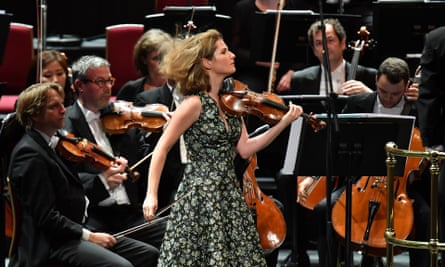Harrison Birtwistle once said that he feels that he is constantly composing the same piece, that each new work makes a different journey through the same mass of endlessly renewable musical material to find fresh perspectives within it. As if to underline that, his latest orchestral work, Deep Time, completes a trilogy begun more than 40 years ago with The Triumph of Time, and continued in the mid-1980s with Earth Dances. Daniel Barenboim and the Staatskapelle Berlin gave the first performance of the new 25-minute piece last month in Berlin, and brought it to the Proms in the second of their pair of concerts during the opening weekend, which featured both of Elgar’s symphonies.
Deep Time is dedicated to the memory of Peter Maxwell Davies, who died last year, and whom Birtwistle had known since they studied together in Manchester in the 1950s. The title comes from the notion first put forward by geologist James Hutton in the 18th century of how endless accretion and erosion have shaped and reshaped landscapes over unfathomably long periods of time. If that connects with the idea of instrumental strata, which Birtwistle explored in Earth Dances, then the sense of the work as a slowly evolving processional, marking out and measuring time as it goes along, harks right back to The Triumph of Time, too.
Birtwistle may use an orchestra in which low-pitched instruments – tubas, bass and contrabass clarinets, contrabassoons – are emphasised, but the landscapes that the music traverses are wonderfully varied and coloured. There are pulsing Stravinskyan repetitions, cascades of chattering woodwind, Boulez-like toccatas of tuned percussion and long-limbed solos, led off of by soprano saxophone, which float over transparent webs of strings. But there’s little of the eruptive violence of Earth Dances, just a single gong-laden climax before the end is signalled in a blaze of tubular bells. It’s an immensely powerful, sometimes breathtakingly beautiful work, one of Birtwistle’s finest orchestral achievements, and already played with astonishing assurance by Barenboim and his orchestra.
But then both of the Staatskapelle’s concerts were a reminder that it has few peers among European bands today. The Elgar symphonies – the First preceded by Sibelius’s Violin Concerto, with Lisa Batiashvili as the fabulously agile, intense soloist, the Second following the Birtwistle – were played with immense authority, and as much stylistic confidence as these players would bring to Wagner or Strauss. Barenboim’s return to Elgar, to works that he began conducting early in his career on the podium, when he recorded all of the major orchestral scores for the first time, seems to have been inspired by working with the Berlin orchestra. Much more than most of his British contemporaries, Elgar has always seemed a thoroughly European composer, whose stylistic roots delve so deeply into the Austro-German tradition, and hearing his music played by an orchestra at the very heart of that tradition reinforces those affiliations.

Both performances were magnificent. However, as in his recordings of the two symphonies with this orchestra, which were released in reverse order in 2014 and 2016, Barenboim didn’t nail every facet of the works. The return of the motto theme in the closing pages of the First Symphony didn’t quite sweep everything before it as it can in some performances. Meanwhile, the urgency with which he launched into the first movement of the Second wasn’t quite balanced against his treatment of its funeral-march slow movement, with its extraordinary wandering oboe solo threaded through its reprise, which seemed fractionally too fast to be totally effective. But the overall impact of works was sometimes spectacular, from the fierce assertiveness of the brass to the refinement that the Staatskapelle strings brought to the most hushed passages.
There were encores after both concerts - Sibelius’s Valse Triste and Elgar’s Pomp and Circumstance March No 1in the first; Nimrod from the Enigma Variations and then Pomp and Circumstance again in the second. And between the items in the second concert there was a short speech by Barenboim about the importance and coherence of European culture in all its diversity, and of the crucial role of education in maintaining it. But in many ways the music he had just conducted had made his point for him: here was a German orchestra giving superb performances of Britain’s finest symphonist and its greatest living composer, each first and foremost part of a wider European tradition.

Comments (…)
Sign in or create your Guardian account to join the discussion